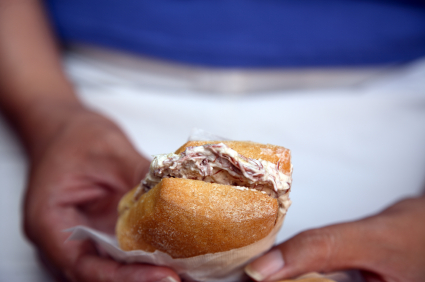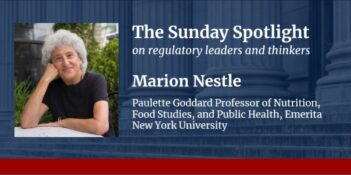
Why country-of-origin-labeling is not the right solution.
Although the current horse meat scandal was initially depicted as an isolated instance of fraud and mislabeling generated by a single source of contamination, it is progressively escalating into a much broader food safety crisis. This in turn reveals the existence of a more generalized set of misleading labeling practices that could escape the EU’s supposedly strict food regulatory regime.
The horse meat scandal began last month when the Food Safety Authority of Ireland, testing suspiciously frozen beef burgers, discovered they contained horse DNA. Since then, similar discoveries have swept across Europe, in countries such as the UK, France, Spain, Germany, Denmark, Sweden and Norway, prompting several supermarkets as well as food giants, like Nestlé, to withdraw some of their meat-processed products.
Both government food safety authorities and private business operators have too quickly dismissed the ongoing crisis as an isolated instance of contamination of beef products with horse meat that entered the EU food chain. The European Food Safety Authority (EFSA) has maintained that “there is no evidence to date of a food safety concern,” a position that has been echoed by several multinational food companies.
In the absence of a general food safety concern, European countries cannot legally ban the import into their territory of any given product, thus safeguarding the sanctity of the EU internal market. Furthermore, in these circumstances, the EU does not enjoy the legal competence to step in and respond.
Although under EU rules it is illegal to label a product beef if another type of meat is present (see Directive 2000/13 as well as Regulation 178/2002), it is for the Member States (and not the EU) to enforce such a prohibition. Therefore, by relegating the ongoing scandal into an isolated fraud that merely “raises issues of false labeling, food quality and traceability in the EU food chain,” as EFSA stated on February 11, the EU has limited itself simply to launching, under the supervision of EUROPOL, a EU-wide fraud investigation.
Meanwhile, as a result of the fraudulent contamination, there is growing concern that the veterinary painkiller phenylbutazone, whose use in bred-horses is prohibited, could have nevertheless entered the EU food chain.
These events, by turning a consumer fraud issue into a potential food safety crisis, has prompted the EU Commission to hold an extraordinary session of the Standing Committee of the Food Chain and Animal Health, in which the Member States’ representatives endorsed the coordinated plan recently announced by Health & Consumer Policy Commissioner Tonio Borg. This plan, which may last for several months, aims to establish the presence of unlabeled horse meat in foods and to detect possible residues of phenylbutazone in horse meat.
Amid the public outcry about the ongoing horse meat scandal, the discovery of unlabeled traces of horse meat in beef products has already prompted a demand for the introduction of further regulatory requirements governing the marketing and labeling of food products. In particular, several members of the European Parliament, consumer organizations, commentators, and the EU Commissioner seem to view mandatory country-of-origin-labeling (COOL) as a panacea capable of preventing the sort of misleading practices that appear to underlie the horse meat crisis.
Yet before rushing to the first fancy policy options available, one has to consider holistically what would be the expected benefits from an extension of COOL to more food products, and then to compare those benefits with the additional costs such an extension would generate. Mandatory origin provisions have been developed for many food products, such as honey, fruit and vegetables, fish, and olive oil. Following the bovine spongiform encephalopathy (BSE) crisis of over a decade ago, these labeling rules also apply to all beef and beef products. Yet no country of origin labeling is required for meat used as an ingredient in beef products.
Will an extension of COOL to meat used as an ingredient – as currently envisaged by Article 26(6) of the new Regulation on Food Information to Consumers – be capable of preventing a new horse meat scandal from happening again? Proponents of COOL suggest that mandating the labeling of the origin of meat products may produce the effect of shortening the long and complex food supply chain, which would allegedly the main reason for the current mislabeling scandal. Yet, it appears quite farfetched to believe that the imposition of an additional requirement about the indication of the origin of a meat ingredient of a product will be sufficient to attain such an ambitious objective.
It is the job of separate traceability requirements to enable authorities as well as companies to trace back – even in the case of long and complex food supply chain – the journey made by a food or a food ingredient. Traceability requirements seem to have served, in the present circumstances, their declared purpose by enabling the various national authorities to quickly identify the various sources of contamination. Yet no regulatory requirement besides more effective food controls will be able to prevent misleading practices from arising in the first place.
Unfortunately, the public outcry generated by the ongoing horse meat scandal is likely to introduce unhelpful emotions
into the impact assessment that is currently being performed by the EU Commission as to the feasibility and opportunity of extending COOL to meat used as ingredient (and to other primary ingredients, such as cocoa, flour, and vegetable oil). Once again, policymakers seem poised to try to create for European consumers the illusion that they have addressed public concerns by settling on the first available policy option that promises a quick fix.
Creating rules is definitely easier, yet still more expensive, than making sure that they are abided by and actually work to achieve their desired objectives.




